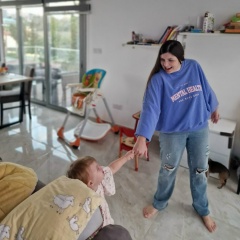Бали. Если верить агенту по подбору туров Патрику, маневрирующему на мотороллере среди оживленного балийского трафика, самолеты приземляются и улетают с острова каждые 3 минуты. Это похоже на правду. Если смотреть на небо сидя у океана — самолеты шныряют по небу туда и обратно без остановки. Кажется, кто–то однажды в порыве веселья запустил этот бесконечный конвейер отдыхающих. Вечером, в 6 часов, побережье курортного местечка Кута превратится в одно большое футбольное поле. Потом случится закат, галдеж наблюдающих его у океана не утихнет. Когда станет совсем темно, жизнь переместится в бары и клубы. Здесь так много тех, кого балийцы между собой называют «аузи» (от англ. «нойзи» — «шумный»). Австралийцы купили себе «проездной» в этот рай для серферов и не только, поселившись неподалеку. Когда узнаешь, сколько они платят за билет в обе стороны ($ 200), хочется их задушить. Раз в год обычный ритм затихает. Происходит это в первый день десятого месяца балийского лунного календаря, когда наступает Nyepi, или День тишины. В этом году он пришелся на 23 марта. Праздник связан с ритуалом очищения пространства. Ровно на 1 день остров погружается в тишину, запрещена любая деятельность. Нельзя выходить на улицу, передвигаться по острову, работать, громко разговаривать, смотреть телевизор, пользоваться электричеством, а также есть. День нужно посвятить медитациям, размышлениям и молитве.
«Если вы оказались на Бали на Ниепи, вам крупно повезло!» — расхваливал местную традицию журнальчик из забегаловки. Однако холодок все же подступал к сердцам туристов по мере приближения праздника. Ни один ресторан не обслужит вас в этот день, освещения на улицах и на территории отеля тоже не будет. Хостес обходит постояльцев с вопросом, купили ли они еды и в курсе ли, что на улицу выходить будет нельзя. Такая предосторожность неспроста, ведь единственные, кому позволено выбираться на улицу в Ниепи, — это полиция, налагающая арест на всех, кто не смог усидеть дома.
Бали — единственный в Индонезии остров, где сохранилась древняя религия хинду, на других островах по большей части мусульманство.
Остров называют намоленным — церемонии здесь совершаются каждый день с самого утра: в храмах, которые есть в каждом балийском доме, возносят подношения богам. Подготовка к празднику начинается за 3 дня. В первый день все церемонии проходят у океана. Сотни людей, одетых в белое, под сильнейшим ливнем идут молиться к океану. Вечером все становятся как–то целомудреннее. Хиты дансинга в ресторане выключают, вместо этого звучит медитационная музыка, напоминающая перезвон колокольчиков.
Накануне Дня тишины происходит шествие Ogoh–Ogoh — огромные фигуры из папье–маше, олицетворяющие демонов и монстров, проносят по всем улицам под улюлюканье и крики толпы. Фигуры настолько огромны, что задевают провода — участникам приходится их приподнимать, чтобы пропустить монстров. В ожидании шествия в мини–мартах царит оживление. «Нет, вы не поняли, нам нужен ящик пива!» — хихикают две немолодые то ли немки, то ли француженки, довольные своей концепцией проведения Ниепи. После движения фигур Ogoh–Ogoh все постепенно замирает — по еле освещенной улице приходится пробираться к дому. Ниепи — еще и возможность поразмышлять о жизни, обратиться к вечному источнику внутри себя, помолиться за родных и за себя. День в тишине дается нелегко и тянется бесконечно, когда привык жить в мире сменяющих друг друга развлечений. Вечером постояльцы, невольно сблизившиеся за день, собираются на террасе ресторана. Через дорогу шумит океан, закат окрашивает облака.
Мы сидим, завороженные этим единственным развлечением на сегодня, пока совсем не стемнеет. В это время полицейские на велосипедах продолжают патрулировать улицы и светить на пляж в поисках нарушителей. Наутро просыпаешься под крики соседа по домику, итальянца, проживающего третий месяц на Бали: «Happy new year! Happy new year!» Ему никто не отвечает. Греет мысль, что с этого утра все начнется по новой.
«Если вы оказались на Бали на Ниепи, вам крупно повезло!» — расхваливал местную традицию журнальчик из забегаловки. Однако холодок все же подступал к сердцам туристов по мере приближения праздника. Ни один ресторан не обслужит вас в этот день, освещения на улицах и на территории отеля тоже не будет. Хостес обходит постояльцев с вопросом, купили ли они еды и в курсе ли, что на улицу выходить будет нельзя. Такая предосторожность неспроста, ведь единственные, кому позволено выбираться на улицу в Ниепи, — это полиция, налагающая арест на всех, кто не смог усидеть дома.
Бали — единственный в Индонезии остров, где сохранилась древняя религия хинду, на других островах по большей части мусульманство.
Остров называют намоленным — церемонии здесь совершаются каждый день с самого утра: в храмах, которые есть в каждом балийском доме, возносят подношения богам. Подготовка к празднику начинается за 3 дня. В первый день все церемонии проходят у океана. Сотни людей, одетых в белое, под сильнейшим ливнем идут молиться к океану. Вечером все становятся как–то целомудреннее. Хиты дансинга в ресторане выключают, вместо этого звучит медитационная музыка, напоминающая перезвон колокольчиков.
Накануне Дня тишины происходит шествие Ogoh–Ogoh — огромные фигуры из папье–маше, олицетворяющие демонов и монстров, проносят по всем улицам под улюлюканье и крики толпы. Фигуры настолько огромны, что задевают провода — участникам приходится их приподнимать, чтобы пропустить монстров. В ожидании шествия в мини–мартах царит оживление. «Нет, вы не поняли, нам нужен ящик пива!» — хихикают две немолодые то ли немки, то ли француженки, довольные своей концепцией проведения Ниепи. После движения фигур Ogoh–Ogoh все постепенно замирает — по еле освещенной улице приходится пробираться к дому. Ниепи — еще и возможность поразмышлять о жизни, обратиться к вечному источнику внутри себя, помолиться за родных и за себя. День в тишине дается нелегко и тянется бесконечно, когда привык жить в мире сменяющих друг друга развлечений. Вечером постояльцы, невольно сблизившиеся за день, собираются на террасе ресторана. Через дорогу шумит океан, закат окрашивает облака.
Мы сидим, завороженные этим единственным развлечением на сегодня, пока совсем не стемнеет. В это время полицейские на велосипедах продолжают патрулировать улицы и светить на пляж в поисках нарушителей. Наутро просыпаешься под крики соседа по домику, итальянца, проживающего третий месяц на Бали: «Happy new year! Happy new year!» Ему никто не отвечает. Греет мысль, что с этого утра все начнется по новой.
Bali If you believe the tour selection agent Patrick, who maneuvers on a scooter amid the busy Balinese traffic, the planes land and fly off the island every 3 minutes. That seems to be true. If you look at the sky while sitting by the ocean - planes snooping around the sky back and forth without stopping. It seems that someone once in a fit of fun launched this endless conveyor of vacationers. In the evening, at 6 o’clock, the coast of the resort town of Kuta will turn into one large football field. Then the sunset will happen, the hailage watching it at the ocean will not cease. When it becomes completely dark, life will move to bars and clubs. There are so many of those whom the Balinese call “auzi” among themselves (from the English “noisy” - “noisy”). The Australians bought a "pass" to this paradise for surfers and not only, settling nearby. When you find out how much they pay for a round-trip ticket ($ 200), I want to strangle them. Once a year, the usual rhythm calms down. This happens on the first day of the tenth month of the Balinese lunar calendar, when Nyepi, or Day of Silence, comes. This year it fell on March 23. The holiday is associated with a ritual of purifying space. Exactly for 1 day the island is immersed in silence, any activity is prohibited. You can’t go out, move around the island, work, talk loudly, watch TV, use electricity, or eat. The day should be devoted to meditation, meditation and prayer.
“If you ended up in Bali on Niepi, you are very lucky!” - praised the local tradition magazine from the eatery. However, the chill nevertheless approached the hearts of tourists as the holiday approached. No restaurant will serve you on this day; there will be no lighting on the streets and on the hotel premises either. The hostess bypasses the guests with the question of whether they bought food and if they are aware that it will not be possible to go outside. This precaution is not without reason, because the only ones who are allowed to get out onto the street in Niepi are the police, who arrest everyone who could not sit at home.
Bali is the only island in Indonesia where the ancient Hindu religion has been preserved, on other islands for the most part Islam.
The island is called prayed - ceremonies are held here every day in the morning: in the temples that are in every Balinese house, offerings are offered to the gods. Preparation for the holiday begins in 3 days. On the first day, all ceremonies take place by the ocean. Hundreds of people dressed in white, under heavy rain, go to pray to the ocean. In the evening, everyone becomes somehow more chaste. The restaurant’s dance hits are turned off; instead, meditation music resembles the chimes of bells.
On the eve of the Day of Silence, the Ogoh – Ogoh procession takes place - huge papier-mâché figures personifying demons and monsters are carried along all the streets to the hooting and screaming of the crowd. The figures are so huge that they touch the wires - participants have to lift them to let the monsters through. In anticipation of the procession, revival reigns in mini-martes. “No, you don’t understand, we need a box of beer!” - giggle two elderly either Germans or French women, satisfied with their concept of conducting Niepi. After the movement of the Ogoh – Ogoh figures, everything gradually freezes - you have to make your way to the house along a barely lit street. Niepi is also an opportunity to reflect on life, to turn to an eternal source within oneself, to pray for relatives and for oneself. A day in silence is not easy and lasts forever when you are used to living in a world of successive amusements. In the evening, guests involuntarily bonded for the day, gather on the terrace of the restaurant. Across the road, the ocean rustles, the sunset colors the clouds.
We sit, bewitched by this only entertainment for today, until it gets completely dark. At this time, police on bicycles continue to patrol the streets and shine on the beach in search of intruders. The next morning you wake up to the cries of a neighbor in the house, an Italian, who has been living in Bali for the third month: “Happy new year! Happy new year! ” Nobody answers him. The idea is warming that this morning everything will start in a new way.
“If you ended up in Bali on Niepi, you are very lucky!” - praised the local tradition magazine from the eatery. However, the chill nevertheless approached the hearts of tourists as the holiday approached. No restaurant will serve you on this day; there will be no lighting on the streets and on the hotel premises either. The hostess bypasses the guests with the question of whether they bought food and if they are aware that it will not be possible to go outside. This precaution is not without reason, because the only ones who are allowed to get out onto the street in Niepi are the police, who arrest everyone who could not sit at home.
Bali is the only island in Indonesia where the ancient Hindu religion has been preserved, on other islands for the most part Islam.
The island is called prayed - ceremonies are held here every day in the morning: in the temples that are in every Balinese house, offerings are offered to the gods. Preparation for the holiday begins in 3 days. On the first day, all ceremonies take place by the ocean. Hundreds of people dressed in white, under heavy rain, go to pray to the ocean. In the evening, everyone becomes somehow more chaste. The restaurant’s dance hits are turned off; instead, meditation music resembles the chimes of bells.
On the eve of the Day of Silence, the Ogoh – Ogoh procession takes place - huge papier-mâché figures personifying demons and monsters are carried along all the streets to the hooting and screaming of the crowd. The figures are so huge that they touch the wires - participants have to lift them to let the monsters through. In anticipation of the procession, revival reigns in mini-martes. “No, you don’t understand, we need a box of beer!” - giggle two elderly either Germans or French women, satisfied with their concept of conducting Niepi. After the movement of the Ogoh – Ogoh figures, everything gradually freezes - you have to make your way to the house along a barely lit street. Niepi is also an opportunity to reflect on life, to turn to an eternal source within oneself, to pray for relatives and for oneself. A day in silence is not easy and lasts forever when you are used to living in a world of successive amusements. In the evening, guests involuntarily bonded for the day, gather on the terrace of the restaurant. Across the road, the ocean rustles, the sunset colors the clouds.
We sit, bewitched by this only entertainment for today, until it gets completely dark. At this time, police on bicycles continue to patrol the streets and shine on the beach in search of intruders. The next morning you wake up to the cries of a neighbor in the house, an Italian, who has been living in Bali for the third month: “Happy new year! Happy new year! ” Nobody answers him. The idea is warming that this morning everything will start in a new way.
У записи 18 лайков,
0 репостов.
0 репостов.
Эту запись оставил(а) на своей стене Анна Джанибекова




































